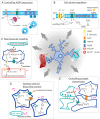Astrocytic TRPV4 Channels and Their Role in Brain Ischemia
- PMID: 37108263
- PMCID: PMC10138480
- DOI: 10.3390/ijms24087101
Astrocytic TRPV4 Channels and Their Role in Brain Ischemia
Abstract
Transient receptor potential cation channels subfamily V member 4 (TRPV4) are non-selective cation channels expressed in different cell types of the central nervous system. These channels can be activated by diverse physical and chemical stimuli, including heat and mechanical stress. In astrocytes, they are involved in the modulation of neuronal excitability, control of blood flow, and brain edema formation. All these processes are significantly impaired in cerebral ischemia due to insufficient blood supply to the tissue, resulting in energy depletion, ionic disbalance, and excitotoxicity. The polymodal cation channel TRPV4, which mediates Ca2+ influx into the cell because of activation by various stimuli, is one of the potential therapeutic targets in the treatment of cerebral ischemia. However, its expression and function vary significantly between brain cell types, and therefore, the effect of its modulation in healthy tissue and pathology needs to be carefully studied and evaluated. In this review, we provide a summary of available information on TRPV4 channels and their expression in healthy and injured neural cells, with a particular focus on their role in ischemic brain injury.
Keywords: Ca2+ signaling; TRPV4; astrocytes; glia; ischemia.
Conflict of interest statement
The authors declare no conflict of interest.
Figures


Similar articles
-
TRPV4 channels stimulate Ca2+-induced Ca2+ release in astrocytic endfeet and amplify neurovascular coupling responses.Proc Natl Acad Sci U S A. 2013 Apr 9;110(15):6157-62. doi: 10.1073/pnas.1216514110. Epub 2013 Mar 25. Proc Natl Acad Sci U S A. 2013. PMID: 23530219 Free PMC article.
-
The increased activity of TRPV4 channel in the astrocytes of the adult rat hippocampus after cerebral hypoxia/ischemia.PLoS One. 2012;7(6):e39959. doi: 10.1371/journal.pone.0039959. Epub 2012 Jun 27. PLoS One. 2012. PMID: 22761937 Free PMC article.
-
Activation of TRPV4 channels promotes the loss of cellular ATP in organotypic slices of the mouse neocortex exposed to chemical ischemia.J Physiol. 2023 Jul;601(14):2975-2990. doi: 10.1113/JP284430. Epub 2023 Jun 6. J Physiol. 2023. PMID: 37195195
-
TRPV4 and the regulation of vascular tone.J Cardiovasc Pharmacol. 2013 Feb;61(2):113-9. doi: 10.1097/FJC.0b013e318279ba42. J Cardiovasc Pharmacol. 2013. PMID: 23107877 Free PMC article. Review.
-
TRPV4: a Sensor for Homeostasis and Pathological Events in the CNS.Mol Neurobiol. 2018 Nov;55(11):8695-8708. doi: 10.1007/s12035-018-0998-8. Epub 2018 Mar 26. Mol Neurobiol. 2018. PMID: 29582401 Review.
Cited by
-
Neuroprotective Effects of Aucubin against Cerebral Ischemia and Ischemia Injury through the Inhibition of the TLR4/NF-κB Inflammatory Signaling Pathway in Gerbils.Int J Mol Sci. 2024 Mar 19;25(6):3461. doi: 10.3390/ijms25063461. Int J Mol Sci. 2024. PMID: 38542434 Free PMC article.
-
Development of an In Vitro Model to Study Mechanisms of Ultrasound-Targeted Microbubble Cavitation-Mediated Blood-Brain Barrier Opening.Ultrasound Med Biol. 2024 Mar;50(3):425-433. doi: 10.1016/j.ultrasmedbio.2023.12.005. Epub 2023 Dec 29. Ultrasound Med Biol. 2024. PMID: 38158246 Free PMC article.
-
TRPV4-A Multifunctional Cellular Sensor Protein with Therapeutic Potential.Sensors (Basel). 2024 Oct 29;24(21):6923. doi: 10.3390/s24216923. Sensors (Basel). 2024. PMID: 39517820 Free PMC article. Review.
-
Channels and Transporters in Ischemic Brain Edema.J Inflamm Res. 2025 Mar 1;18:3025-3038. doi: 10.2147/JIR.S503231. eCollection 2025. J Inflamm Res. 2025. PMID: 40046684 Free PMC article. Review.
-
Mechanobiological insight into brain diseases based on mechanosensitive channels: Common mechanisms and clinical potential.CNS Neurosci Ther. 2024 Jun;30(6):e14809. doi: 10.1111/cns.14809. CNS Neurosci Ther. 2024. PMID: 38923822 Free PMC article. Review.
References
Publication types
MeSH terms
Substances
Grants and funding
LinkOut - more resources
Full Text Sources
Miscellaneous

